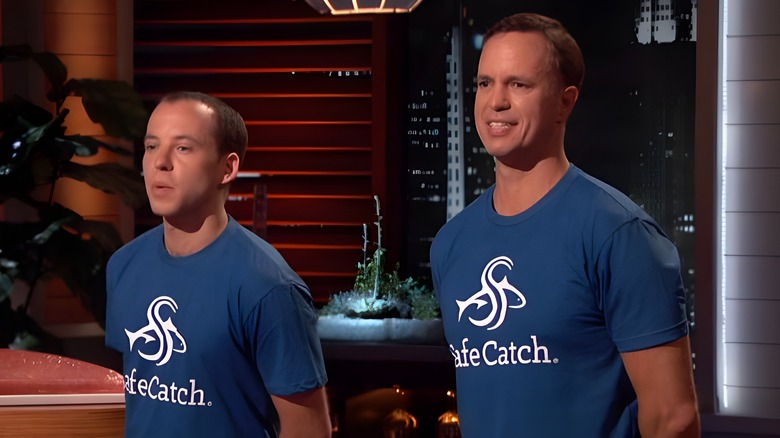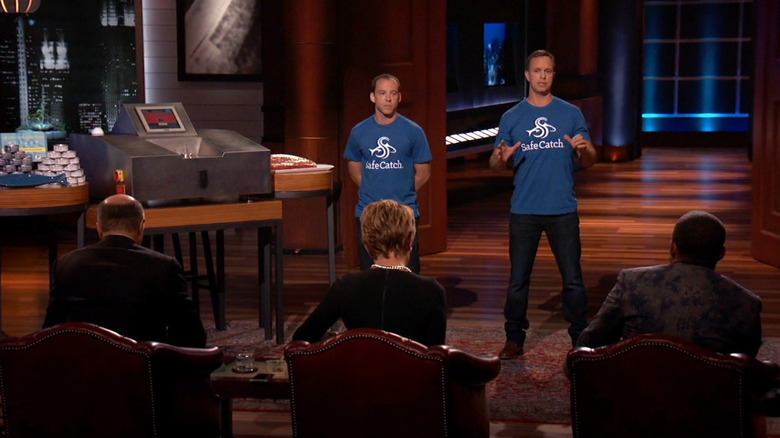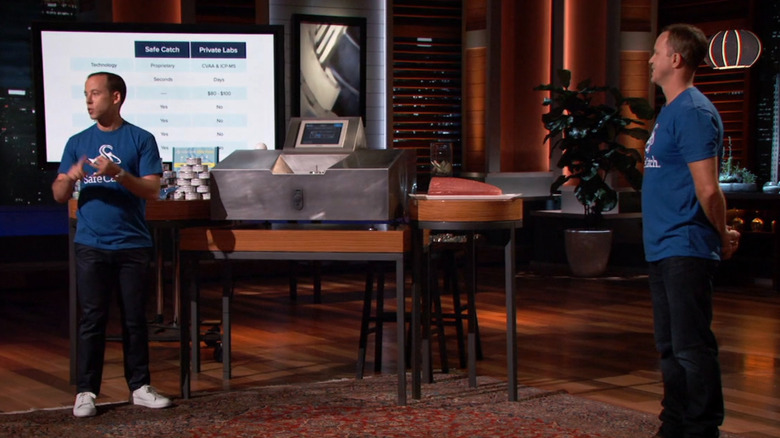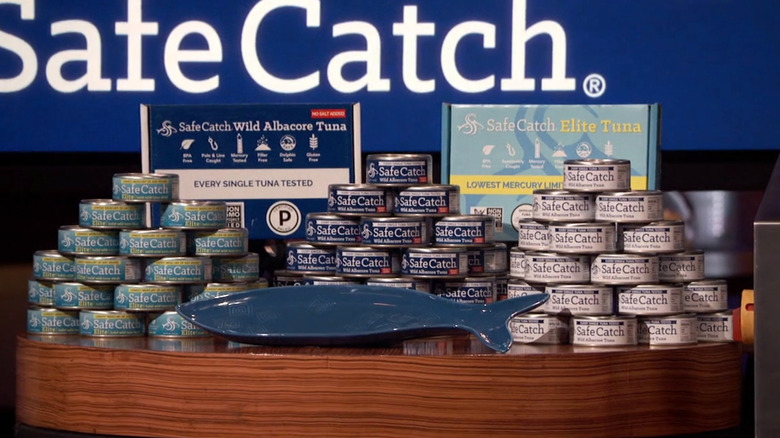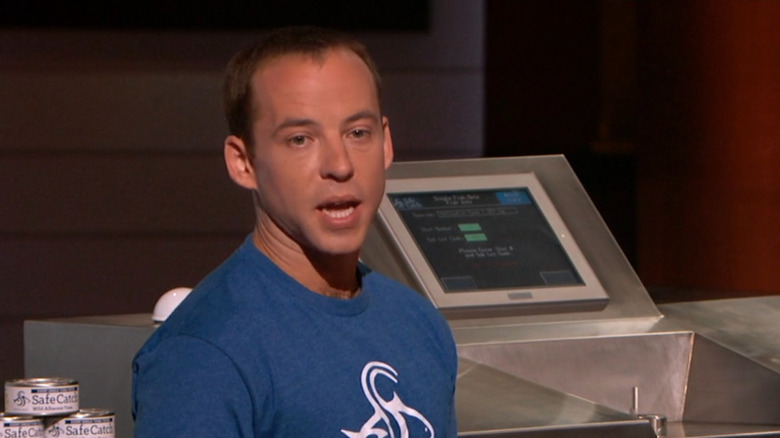Whatever Happened To Safe Catch After Shark Tank?
They may be a popular school lunch staple, but tuna sandwiches come with a hidden danger. Tuna often absorbs the odorless chemical pollutant mercury, which, in large enough amounts, poses a serious risk to the cognitive and nervous system, with children and pregnant mothers especially prone. Over time, people may deal with issues ranging from impaired vision and tremors to memory loss.
Entrepreneurs and childhood friends Sean Wittenberg and Bryan Boches aim to combat this dilemma with their company Safe Catch. When Wittenberg's mom was diagnosed with mercury poisoning in 2004, he initially sought to develop technology that would fast-track mercury detection in tuna and could be used by government and federal operations. When he failed to find places to adopt his machine, Wittenberg and Boches created their own tuna brand with mercury concentration standards ten times stricter than the U.S. Food and Drug Administration. Additionally, not only does their tuna come from sustainable resources, but they also hand-pack their tuna rather than machine processing to retain the fish's nutrients.
In our increasingly health-conscious society, Safe Catch has been on the rise, with major outlets such as GQ, Time Magazine, and The Wall Street Journal, among others, commending the company's efforts. But how will the tuna fare when thrown into the "Shark Tank?"
What happened to Safe Catch on Shark Tank?
Season 8 of "Shark Tank" sees Sean Wittenberg and Bryan Boches seek a $600,000 investment for a 3% equity stake in Safe Catch. The duo demonstrates their mercury-testing technology while informing the Sharks that fewer people are buying tuna due to concerns regarding mercury. Lori Greiner is among those who have issues with the lack of mercury regulation.
Each can costs $1.20 to produce and retails for between $3 and $4. While this is more expensive than average brands, it still costs less than similar premium lines. The company initially had 100 investors to aid in developing the mercury-testing device over 10 years. The team raised $14 million to bring on physicists and engineers. However, as things failed to move forward, the investors left and Boches and Wittenberg bought out the business for under $1 million, with Boches investing another $900,000 into Safe Catch. They have been in 2,100 retailers for a year with sales equalling $1.25 million. However, due to their $900,000 in accumulated debt, Safe Catch is losing money, having lost $530,000 at the time of their "Shark Tank" episode.
The iffy numbers give the wealthy investors cold feet. While many of them admire what the duo is doing to create a healthier market, they don't believe that the team can convince the industry to adopt their strategy in time to justify the $20 million valuation. As a result, the sharks don't grab the bait and all go out.
Safe Catch after Shark Tank
Safe Catch's "Shark Tank" segment aired on November 4, 2016. While the company didn't score a deal on the show, the future was bright for Safe Catch and its founders.
2018 proved to be an eventful year for Safe Catch. In February the company secured $5 million in a seed funding round from Echo Capital. This was not only good news for Safe Catch, which was in the process of expanding its product line with a variety of spiced tuna and salmon options, but Echo saw it as an opportunity to continue its mission of working alongside game-changing businesses.
"Echo Capital partners with companies that make innovative products with a social conscious," said the company's Ben Levy in a press statement. "As the only brand that can verify the lowest mercury, Safe Catch provides trust and transparency that Millennial consumers are looking for with the delicious culinary flavors they expect." Not long after, Safe Catch made another crucial connection as they managed to get distribution in Kroger stores nationwide, a major step in increasing customer awareness.
Despite these triumphs, Safe Catch hit a snag in 2021. The National Advertising Division, a faction of the Better Business Bureau, urged the business to modify many of its claims. While certain statements such as all its tuna being sustainably sourced and having the lowest mercury count were considered acceptable, others, including endorsements from the American Pregnancy Association and Parent's Magazine as well as its assertions that other tuna brands posed significant health concerns, were seen as being in poor taste. Safe Catch disagreed with many of these accusations but respectfully took the NDA's recommendations.
Is Safe Catch still in business?
Through all its victories and hardships, Safe Catch has succeeded in rapid growth over the years. The low-mercury tuna brand can be found in just about every major retailer out there, including Walmart, Kroger, Target, Publix, and Thrive Market, to name a few. Customers looking to save time and buy in bulk can order their Safe Catch tuna online, either through the company's official website or on Amazon. Its selection has gone on to include seafood products such as Pacific pink salmon, sardines, and mackerel.
Much of Safe Catch's increased awareness can be attributed to its high reviews, with a 4.6-star average rating on Amazon alone. The brand has even received high marks from some notable names. In 2018, singer and actor Nick Jonas posted a video on his Instagram story showcasing his recipe for an ideal after-workout tuna salad made using Safe Catch. The admitted "tuna enthusiast" gushed throughout the video about the product's quality. More recently, Safe Catch's Wild Ahi Yellowfin Tuna Pouches were named Best Protein-Packed Favorites from the 2023 Good Housekeeping Best Snack Award.
What's next for Safe Catch?
While still running Safe Catch, founders Sean Wittenberg and Bryan Boches have brought their business expertise to other ventures. Since 2012, Boches has served as an advisor and board member of such organizations as CapSeed, Blinker app, and TEDx Marin. Wittenberg's career path has stayed more in line with his "Shark Tank" company. In 2022 he founded Pure Cravings, a line of premium cat food that, just like Safe Catch, conducts strict mercury testing on all fish items.
As for Safe Catch, it seems that the company is satisfied with introducing new products to feed its ever-growing audience. However, Safe Catch's initial goal of challenging industry norms has not changed and the team hopes that their efforts will be noticed by other major tuna brands. In an interview with Pacific Sun, Wittenberg commented, "Maybe other companies will start following our lead. Why not? I think about this sometimes, but if there had been better testing back when I was a kid, and companies more dedicated to the health of their customers than making a product, my mom would have been fine. She'd never have gotten sick." Realizing that it has a mission bigger than itself, Safe Catch is leading the charge into a new age of healthy living.
